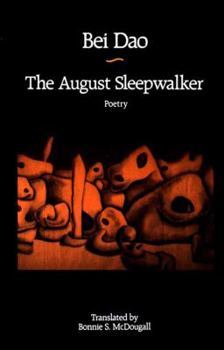The August Sleepwalker
Select Format
Select Condition 
Book Overview
First published in the US in 1990, the year after the uprising of Chinese students at Tiananmen Square, The August Sleepwalker collects all the early poetry of Bei Dao, China's premier poet, now living in exile. The August Sleepwalker is an extremely popular book (30,000 copies sold in China in one month) which was quickly banned by the Chinese government. The collection includes all of the poems Bei Dao published between 1970 and 1986...
Format:Paperback
Language:English
ISBN:0811211320
ISBN13:9780811211321
Release Date:April 2001
Publisher:New Directions Publishing Corporation
Length:140 Pages
Weight:0.38 lbs.
Dimensions:0.4" x 5.4" x 8.0"
Customer Reviews
2 ratings
A poet of both nature and the human world
Published by Thriftbooks.com User , 18 years ago
"The August Sleepwalker," by Bei Dao, has been translated into English by Bonnie S. McDougall. She also contributes an introduction and a preface. McDougall notes that Bei Dao is the pen name of Zhao Zhenkai, who was born in Beijing in 1949. McDougall adds that he was one of China's "underground poets of the seventies," and that he was "in involuntary exile abroad" at the time she wrote her preface (1989). I found this to be a compelling volume of poetry. Bei Dao's work is often quite sad and haunting, and at times very passionate and beautiful. Particularly interesting is his use of parallel structures in his poems. He uses a rich variety of different parallel forms; this structural diversity brings a continual freshness and vitality to the book as a whole. Bei Dao makes frequent use of nature imagery--a mountain range, a snowflake, lightning, wild geese, the "rustle of wind through the grass," etc. At times his work has a haiku-like quality. But he also uses very concrete phenomena from the human world in his poems: a lavatory wall, the wail of a fire engine, "a silent cigarette." His voice in some poems sounds like that of an iconoclastic prophet--a tragic outsider who remains engaged with humanity and who challenges us to look at the world with a fresh new perspective. His imagery is often quite startling; consider such lines as "a baked fish dreaming of the sea" and "piles of endlessly bickering books." Some standout poems in the collection are as follows. "Hello, Baihua Mountain": an invigorating poem with great nature imagery. "You Said": interesting use of dialogue within one of his parallel structures. "The Artist's Life": beginning with the line "Go and buy a radish," this poem has a satiric, even absurdist flavor. "Resume": another poem with a strong satiric flavor. "Language": a critique of language and rational thought. "Smiles, Snowflakes, Tears": evoking a sense of wonder and beauty, this poem reminded me of Pablo Neruda's "Book of Questions." But my favorite poem in the collecton is definitely "The Orange is Ripe." With a particularly well-crafted parallel structure, this poem appeals to both the senses and the emotions.
difficult but great
Published by Thriftbooks.com User , 20 years ago
dao's poetry may be difficult for the reader of conventional poetry to comprehend at first, but any sustained concentration on his verse reveals what he is really doing: rather than creating poetic stories or boring political drivel, he is creating images and sensations of the imagination, things that can only 'be' because of the word. if one were to categorize him permanently, which i would be hesitant to do, he would fall into the surrealist camp. he is a poet of the inner world rather the outer. there is a pessimism in his poems that some will find repulsive, others attractive. great stuff





